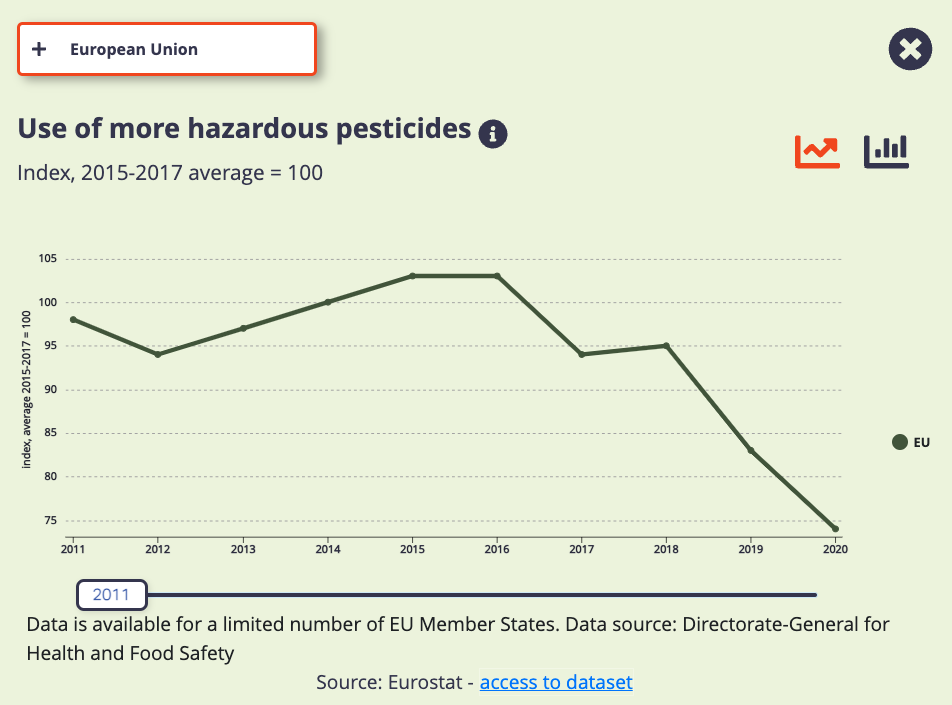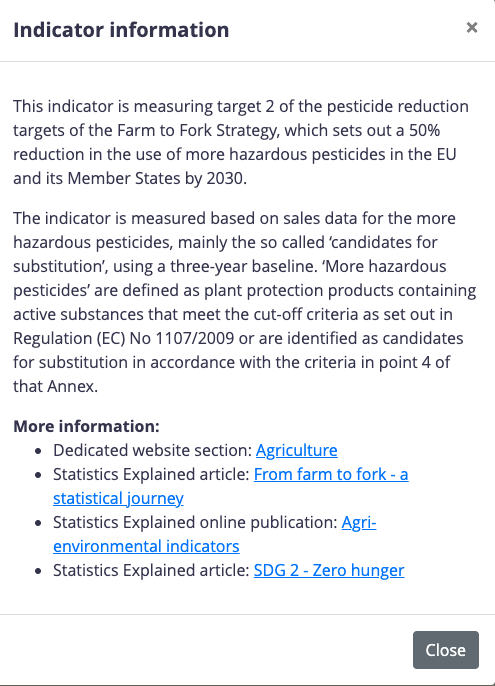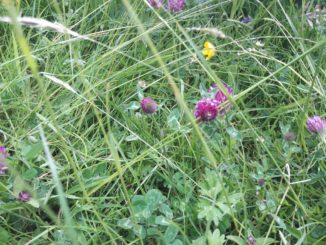
SUR-e Horizons…in 2024
In the March 20th meeting of AgriFish, the EU Nature Restoration Law was up for discussion. A sentiment echoed by many is one of Charlie McConalogue, who supports the proposal except for the fact that it presents too many challenges… everywhere: in food, forestry, and marine. More coming on this, but could it be that the Nature Restoration Law sees the same fate as the SUR? Hard legislation that requires action is easiest when watered down, or pushed to the back boiler to hopefully evaporate.
Last week Euractiv broke the news that the SUR deal will not be voted on by the AGRI committee until July, and the ENVI committee won’t vote on it until after the summer holidays, in September.
The environment committee’s draft report wants more substantial EU-wide pesticide reductions, including an 80% decrease in most hazardous pesticides (compared to the Commission’s proposed 50%). The agriculture committee claims a need for a balanced approach between pesticide cuts and food security. The center-right EPP opposes the SUR proposal (the regulation on the sustainable use of plant protection products) due to a perceived threat to food security. However, as we’ve seen since the beginning of the war in Ukraine – nay, since the Covid pandemic – long-term food security requires a significant reduction in pesticide use and risk.

A Step-by-Step in Derailing Pesticide Regulation
In December, EU Agri ministers filed an official request for additional impact assessments and data on the implications of the law before making any decisions. The EU Parliament Agriculture Committee chair reiterated these stalling tactics, by informing Parliamentary President Roberta Metsola that it would not give its take on the proposal until after it has received supplementary data.
Began in the French presidency, stalled in the Czech, and now muddling its way through the Swedish EU Presidency, the SUR pesticides reduction regulation is stewing. With a first vote in July, the buck will successfully be passed to yet another EU Presidency, the Belgian one. And there are concerns that the Belgians won’t be able to push it through before the end of the year, considering the tensions between the ENVI and AGRI committees regarding the legislation.
The public has been repeatedly assured that the Commission will continue negotiating different aspects of the legislation while the additional data is being prepared. However, what good are these negotiations if the law gets buried in a game of driving down the clock? If the law is not passed by the end of the year, it risks being pushed off the table before Parliamentary elections in 2024.
On March 22, The European Commission Vice-President, Maroš Šefčovič, has written a letter to Minister Roswall in reference to the request for a study complementing the impact assessment of the SUR. Šefčovič’s letter points out that the impact assessment accompanying the SUR proposal was carried out fully in line with the Better Regulation procedures and obtained a positive opinion from the Regulatory Scrutiny Board.
“All stakeholders and Member States had multiple opportunities to provide input, including relevant data, to this work. General aspects of food security and other elements requested in the Council Decision in relation to the impacts of sensitive area provisions, the limited availability of alternatives and the effects of the proposal on small and medium-sized enterprises were assessed in the impact assessment, which built on supporting external studies and other sources of data available to the Commission. Certain limitations in the specific pesticide use data available at Union level restricted the analytical possibilities.”
However, certain limitations in the specific pesticide use data available at Union level restricted the analytical possibilities. The letter references the staff working document published in January 2023 on the drivers of food security, in a context of the war in Ukraine, which provides a factual assessment of the key drivers and their interlinkages, based on available information and literature. On the basis of the Council request, the Commission will be providing additional input, as requested by the Council, on the basis of available evidence and data as soon as it becomes available in the course of spring 2023.
“The analysis clearly shows that climate change, biodiversity loss and land degradation effects (in particular, droughts and loss of pollinators) are key factors in relation to food security. Additionally, while acknowledging that chemical/synthetic pesticides contribute to stabilising yields in the short-term, the analysis identifies the positive effects of pesticide use reduction on soil health and biodiversity, which will have a positive impact on food security in the medium- to long-term. The analysis also recognises that the ability to ensure food security in the long-term requires consistent policy interventions that reinforce sustainability and resilience of the food system.”
Pesticide Use is Going Down Anyway Right?
It’s hard to tell. Which is why the SUR’s binding reporting requirements are needed. The Commission also recently released some exciting statistics on the Green Deal, showing a significant drop already from 2017-2020 in “use of more hazardous pesticides”:

Interesting, since the data actually is based on the sale of pesticides. Which is not representative of the actual use of pesticides.

A clear idea of use of pesticides in the EU is in fact still far away – and clear monitoring methods and frequency reporting are part of the reglementation in question.
And the private sector is far from innocent…
It’s easy to think of the traditional agri-sector as old and clunky, but it’s meaner and leaner than it may appear to be at first. Vakita France published an exposé on how pesticide giant Bayer is using influencers at the Salon de l’Agriculture (@jenny_letellier, the influencer in question has since issued an apology and removed the posts saying she does not share the same values as Bayer). By the way, Bayer has the highest budget in Brussels for lobbying: more than €4.25 million per year, according to an Investigate Europe report, presumably not all spent on influencers.
Despite influencers, the lobbies can’t cover up the data though. Numerous studies show the dangers of pesticides. The use of pesticides has been linked to the decimation of bird populations in Europe; in France Benoît Fontaine does not stop sounding the alarm about the 30% drop in bird populations in 30 years – a drop that is in no small part due to the use and overuse of pesticides.
And of course, it’s not safe for humans either. The city of Redon, France, recognized on March 14, 2023 the development of Parkinson’s disease by a former municipal gardener as an occupational disease, due to his work time exposure to pesticides for more than 20 years:
Known Unknowns: More Research Needed
For Czech researchers, more concerning than the concentrations of substances detected in water is the cocktail of pesticides lingering in the landscape, since the combined effects of these substances are unknown.
This was one takeaway from an expert panel at the Living Farming Symposium in Prague on March 3-4, organized by AMPI (Czech member of URGENCI). Farmers are often under-informed of the risks related to the use of pesticides, as well as the alternatives, noted Pavel Rotter Ph.D., author of a meta-analysis of pesticide use in the Czech Republic published in November 2022 by Hnutí Duha – Friends of the Earth Czechia.
Meanwhile the higher costs of substitutes such as biopesticides are a barrier to small-scale and medium-scale farmers. Rotter, a researcher at the Czech Crop Research Institute (VÚRV), cited the need for more investment in research to develop the domestic market for pesticide products based on “safe” substances, such as thyme and fennel, and for “reasonable legislation” to speed up the approval process.
Attempts are underway to simplify approvals, pointed out Miroslav Florián, Ph.D., of the Czech agricultural inspection and testing institute (ÚKZÚZ). There are also efforts to harmonize the process with other Member States.
To get this national legislation and the Nature Restoration Law moving, it might be beneficial for Brussels to spend a bit of time looking at the MS level for inspiration to change.
More on the EU and pesticides
Protest, Pesticides and the Parliament – European news round up
The Swedes Enter The Room: What’s on their EU Presidency Agri Programme
SUR – Pesticide Regulation – Delayed by Additional Impact Assessment






